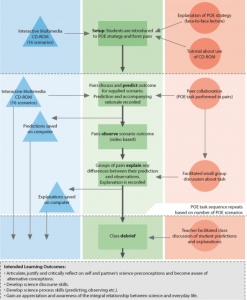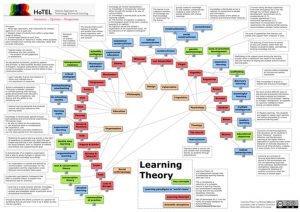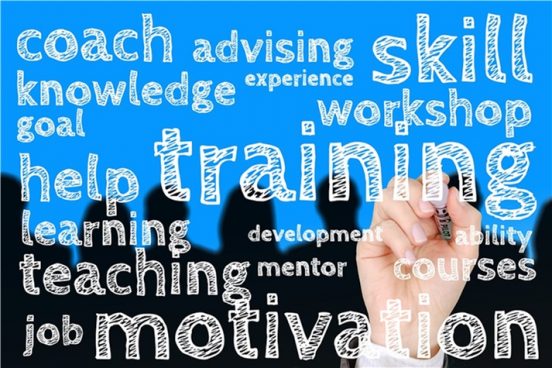This week’s readings revolved around learning design and learning theories as they underpin pedagogical choices. I try not to be negative, I do. I absolutely LOVE my job! So, this week I am attempting to put a positive spin (note the title) on the concepts put forth in these articles. Let us begin…
Learning Design Frameworks and Educator Roles
One reading by Conole (2018), Learning Design and Open Education, discussed various learning design frameworks that illustrate the process of thought and planning (tasks, resources and supports) needed to structure and present learning outcomes to a class. Here is one of the frameworks – the AUTC Learning Design Representation:

While I do not organize and layout outcome planning in this type of framework, I certainly consider and plan each of these aspects in thought. I’ve just never seen it laid out so nicely – no wonder I am exhausted at the end of every teaching day! Any educator worth their paycheck is considering and collating tasks, resources and supports (likely even on the fly) and for every activity, class and course. Wowser!
A second article by Dabbagh (2005), Pedagogical Models for E-Learning: A Theory-Based Design Framework, offers a “theory-based design framework” which consists of a cycle of three recursive components – pedagogical models, instructional strategies, and learning technologies – very similar to the previously discussed TPACK.
While these learning design visualization examples are all lovely, are these authors encouraging educators to create one of these for every activity, outcome, or course? Or is this just something academics publish with no real applicability beyond having other academics read and respond?
Running parallel is an article by Shé Ní et al. (2019), Teaching online is different: Critical perspectives from the literature. Within, the authors discuss the necessary roles and competencies for online educators. Here is a list of the roles: Facilitator, Content Expert, Instructional designer, Researcher, Evaluator, Managerial, Social, Pedagogical, Technical, Assessor.
That’s a lot of roles! And to further paint educators in a MORE amazing light, the authors go on to discuss the many competencies that are required for each of those roles. While the authors do note that the focus of the article is “fully online” higher education courses, I fail to see how these roles are specific for online higher education. And going further, I argue that I can produce empirical evidence that I have filled each of these roles within any given course (maybe in any given week!) – as has any educator in the 21st century.
Now that I have illustrated (with positivity) just how much takes place in the mind of an educator – we really are amazing! Let’s add a dash of negativity. Consider again the learning design frameworks discussed above and mix in the roles and competencies of an e-learning practitioner – already a lot of work. Now, top it all off with academia’s urging that educators should also identify and account for a learning theory which underpins all this planning. Yikes. I’m beginning to feel a tightness in my chest.
A Plethora of Learning Theories
To say the Learning Theory field is muddied would be an understatement. Discussing an excerpt from the HoTEL project, Richard Millwood quotes in his blog: “Learning theory has been a contested scientific field for most of its history, with conflicting contributions from many scientific disciplines, practice and policy positions.” To make things clearer (?) Millwood offers up this graphical summary of all (?) current learning theories:

I dare you – to not only make sense of all of this – but to find the time to identify which learning theory encapsulates your pedagogical mindset (for the present iteration of ‘you’ the educator) whilst staying awake to prep daily lessons for 4 different groups of 30 high school students!
To make matters worse, academics like Dabbagh and Conole acknowledge that some theories are semantically similar, while many others also share overlapping characteristics. Understandably none of these theories are complete, as knowledge building (and the mind/brain that creates and holds this knowledge) is an incredibly complex process that is still not completely understood. However, it begs the question – if we acknowledge that elucidating an invisible and complex process is likely impossible, why ask busy educators to consider it? I accept that it is good practice to consider the pedagogical ramifications of e-learning situations or activities; but beyond the linear and specific theory of SAMR, or the vague but interconnected framework of TPACK, what point is it to delve into multiple competing, incomplete, and sometimes similar learning theories?
I would argue that on any given day I vacillate between multiple theories depending on the class, the assignment and the content area. If I feel the class needs a collaborative exercise, or a hands-on activity, I will just add it – no underpinning discussion needed. To my point, Conole et al. note: “Many described instances of e-learning claim to draw upon theoretical positions, such as constructivism, without explaining how they embody the principles and values of that approach.” Yeah! They can’t be bothered to find the time between the learning design organization and the multiple roles to fill – not because up until this moment they have lacked a perfect visual framework to help encapsulate a theory.
This brings up another point on Conole that I just can’t look past (I can’t help it – I’m analytical). Here is Conole in 2004 positing a cause for the lack of consideration of models and theories by “practitioners”:
“One reason…may be that, as academics outside the field of education, they find the diverse array of theoretical perspectives alien and overwhelming”
Here is Conole in 2018 discussing those same ideas with regards to academics:
“The report highlights the tension between academics wanting to use digital technologies effectively and the bewilderment as to the plethora of learning theories available.”
It seems like over the 14 years of Conole’s research, most everyone has become confused. Conole points out that learning theory and design frameworks have been developed to help educators “select appropriate teaching techniques when redesigning their courses.” This is the right goal. But Conole also goes on to acknowledge that educators learn best from their peers, “innovating their teaching” through discussion and sharing.
In my time as an educator, none of these learning theories have been discussed in a professional development session, a staff meeting, a collegial collaborate space – not once. What has been discussed is how to give students executive functioning skills, collaboration skills, metacognitive skills. To prepare a course based on a learning theory prior to the first day is to disregard the uniqueness of each learner and the complex, fluid nature of teaching. As Shé Ní et al. point out “effective teaching is an art, craft and science.” Yes. Now let us amazing teachers teach.
PHOTO: “Education Hand Write” by Geralt free for use from Pixabay






